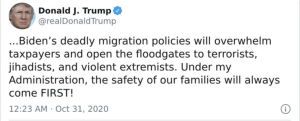1CA. Metaphor Corpus Activity
Robert Poole
Using corpora to explore metaphors in US immigration discourse
This activity is designed to match the content in 1. Metaphor and for use with the Corpus of Contemporary English. If you’re not familiar with the basics, be sure to do C. Introduction to Corpus Analysis first.
In US immigration discourse, metaphors connected to water are frequently present and are realized through a variety of words. Indeed, the metaphor has often been subject of critique. For example, in 1999, Professor Otto Santa Ana of UCLA analyzed 107 articles collected over two years from the Los Angeles Times concerning immigration. One of the most frequent metaphors he found in the articles was IMMIGRANT/IMMIGRATION AS WATER in patterns such as “the flood of illegal immigrants”, “the latest immigrant tide”, “the influx of illegal immigrants”, “failing to stem the flow of illegal immigrants”, “halt the flood of newcomers”, and many more.
It may not be particularly surprising that such metaphors were frequently produced in messages from former president Donald Trump. For example, the tweet below employs the metaphor in its criticism of his presidential election opponent Joseph Biden. Tweeted only days before the 2020 election, Trump suggests that Biden’s policies would “open the floodgates to terrorists, jihadists, and violent extremists”. Clearly, the metaphor is intended to stoke fear regarding his opponent’s possible immigration policies.

The water metaphor regularly appears throughout Trump’s messages on immigration. Table 1 displays instances of the metaphor from October 2020. The following table displays additional instances of the IMMIGRANT AS WATER metaphor from Trump’s campaign speeches in the weeks prior to the 2020 election. He warns of tsunamis of immigrants that will surely come when Biden opens the floodgates. In his hyperbolic warnings of crisis to come, he states that cities will be flooded with immigrants, terrorists, gangs, and refugees.
Table 1: IMMIGRANT AS WATER in Trump speeches
|
Table 1 The above sentences were collected at https://factba.se/trump/ using search terms immigration and flood.
The question to ask is whether such patterning of fear-invoking metaphors affects how people perceive immigrants and immigration as well as the policies and actions they subsequently support. In a recent study published in the Journal of Social and Political Psychology, a team of researchers investigated whether one’s use of the IMMIGRATION/IMMIGRANT AS WATER metaphor influenced and even predicted whether one supported the building of a border wall along the US/Mexico border (Jimenez et al., 2021). Specifically, the research team hypothesized “that using the inundation metaphor to understand immigration contributes to support for a U.S.-Mexico border wall as a figurative means to block immigrants”. Their findings demonstrated that an individual’s use of the water metaphor, or as they refer to it—the inundation metaphor—strongly predicted support for the construction of a border wall. Thus, if one conceptualizes immigration as a flood, then they will then conceive of solutions related to stopping the flow of water. Findings such as these demonstrate that metaphorical expressions influence the ways we perceive and act regarding issues of public policy and open the space for us to reflect upon what other spaces in our lives is our understanding of an important issue shaped by metaphors operating beyond our conscious attention.
Corpus Activity
- It can be difficult to identify instances of a particular metaphor in a large corpus because many words can be deployed to invoke a metaphor. This presents a challenge to corpus linguists seeking to analyze metaphors. In table 1, there were instances of flood, floodgates, and tsunamis. What are other words that one may be used use to create the IMMIGRANT/IMMIGRATION AS WATER metaphor? List three words you intuit may be used to invoke the water metaphor.
- A collocate is a word which frequently appears with the target word; in this case, a word having to do with water would be a collocate of immigrant. One method to identify metaphors in use with a word such as immigrant or immigration is to search for the frequent collocates of the target word in the corpus. Once you have produced a list of collocates, you can examine the list for words which may be producing metaphorical meanings. Check whether some of the water-related words you answered for number 1 are collocates of the target word. In the COCA or the NOW, do a collocates search for immigra* so that you capture collocates for various forms of your target word. In the resulting list, are there words that indicate the use of the water metaphor? If yes, make a list of those words. Are there words present which may be producing different metaphorical meanings? If yes, what are they?
- In COCA, search * of immigration. From the list of phrases, identify those which are related to water, thereby reflecting the immigrants/immigration as water metaphor.
Module author: Robert Poole
Last updated: 21 November 2022
This module is part of Critical Language Awareness: Language Power Techniques and English Grammar, an open educational resource offered by the Clarify Initiative, a privately funded project with the goal of raising critical language awareness and media literacy among students of language and throughout society.



